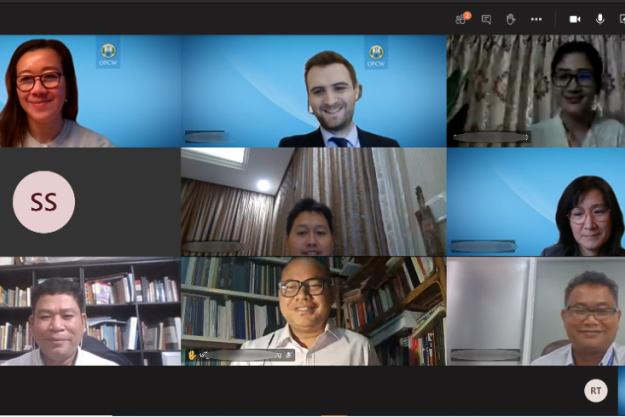
THE HAGUE, Netherlands—15 December 2020—The Organisation for the Prohibition of Chemical Weapons (OPCW) provided legislative assistance to representatives of the Kingdom of Cambodia during a National Legislative Review Forum held online on 11 December. The event was attended by seven delegates from the Cambodian National Authority, the inter-ministerial body that includes the armed forces, customs, and the Ministry of Agriculture, Forestry and Fisheries.
The Deputy Secretary General of the National Authority, Major General Oeur Channa, expressed appreciation for the support provided by the OPCW: “As a country, we experience many challenges in implementing the Chemical Weapons Convention. We look forward to continuing our cooperation with the OPCW Technical Secretariat in enhancing our implementing law to meet the Convention’s requirements.”
The workshop provided an opportunity for the OPCW to offer tailor-made assistance to ensure that Cambodia’s national legislation contains the necessary provisions to fully implement the Chemical Weapons Convention (CWC). The OPCW and Cambodian experts assessed the scope of the country’s existing national laws and regulations, identified possible legal gaps, and explored ways to address them.
Background
As of 31 July 2020, 32 out of 56 OPCW Member States in Asia had adopted comprehensive implementing legislation relating to the Chemical Weapons Convention (CWC). Cambodia has put legislation in place and is currently working on identifying gaps in its legal framework.
The OPCW’s Implementation Support Branch runs a range of programmes aimed at assisting OPCW Member States in developing and adopting implementing legislation relating to the CWC. They include awareness raising and capacity building activities, such as the internship programme for legal drafters and National Authority representatives. The Branch also reviews and provides comment on draft legislation submitted to the OPCW Technical Secretariat by Member States.
As the implementing body for the Chemical Weapons Convention, the OPCW, with its 193 Member States, oversees the global endeavour to permanently eliminate chemical weapons. Since the Convention’s entry into force in 1997, it is the most successful disarmament treaty eliminating an entire class of weapons of mass destruction.
Over 98% of all declared chemical weapon stockpiles have been destroyed under OPCW verification. For its extensive efforts in eliminating chemical weapons, the OPCW received the 2013 Nobel Peace Prize.
